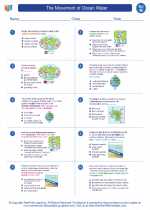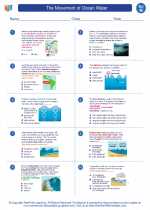Decomposers: Explained
Decomposers are a vital part of the ecosystem, as they play a key role in breaking down organic matter into simpler substances. This process releases nutrients back into the environment, which can then be used by other organisms. Here's a detailed study guide to help you understand decomposers better:
What are decomposers?
Decomposers are organisms that break down dead or decaying organic matter, such as dead plants, animals, and other organic materials. They include various types of bacteria, fungi, and invertebrates like earthworms and some insects.
Why are decomposers important?
Decomposers are crucial for the recycling of nutrients in ecosystems. By breaking down organic matter, they release essential nutrients such as carbon, nitrogen, and phosphorus back into the soil, making them available for uptake by plants. This nutrient recycling is essential for the continuation of the food web and the overall health of the ecosystem.
How do decomposers work?
Decomposers utilize enzymes to break down complex organic molecules into simpler substances. For example, fungi secrete enzymes that break down cellulose and lignin in plant material, while bacteria break down proteins and other organic compounds. Once broken down, these substances can be absorbed and used by the decomposers as a source of energy and nutrients.
Examples of decomposers
- Bacteria: Bacteria such as Bacillus, Clostridium, and Pseudomonas are important decomposers in soil and water environments.
- Fungi: Fungi like mushrooms and molds play a crucial role in decomposing organic matter in forests and other environments.
- Earthworms: These invertebrates burrow through the soil, breaking down organic matter and improving soil structure.
- Beetles and insects: Some insects, such as dung beetles, feed on and break down animal waste, contributing to the decomposition process.
Factors affecting decomposition
Several factors can influence the rate of decomposition, including temperature, moisture, oxygen availability, and the chemical composition of the organic matter. Warmer temperatures and higher moisture levels generally promote faster decomposition, while lack of oxygen (anaerobic conditions) can lead to slower decomposition and the production of methane gas.
Conclusion
Understanding the role of decomposers in ecosystems is crucial for appreciating the interconnectedness of all living organisms. By breaking down organic matter, decomposers contribute to the sustainability and balance of the natural world.
.◂Science Worksheets and Study Guides Eighth Grade. The Movement of Ocean Water

 Worksheet/Answer key
Worksheet/Answer key
 Worksheet/Answer key
Worksheet/Answer key
 Worksheet/Answer key
Worksheet/Answer key
 Vocabulary/Answer key
Vocabulary/Answer key
 Vocabulary/Answer key
Vocabulary/Answer key
